I love graduation season —the pomp, circumstance, and the buzz of excitement (both in the air and on the breath of more than a few graduating seniors). As for the commencement speeches (and I say this as someone who has given a couple), people tend to view them as something to endure, and promptly forget. But since I have you as a somewhat captive audience (not really, you can stop reading here if you want... still reading?) I figured I would take my turn at sharing some thoughts for all those who are moving their tassels from right to left this spring. We will be intercutting the text with some tweets of graduates— just a few of the hundreds I’ve seen. In their stories and pictures we can find hope for our future.
Congratulations Class of 2021, a year I don’t think any of you, or anybody alive on the planet today, is likely to forget. In preparing these thoughts, I endeavored to do a little research into commencement addresses. Now in my days back at Sam Houston State Teachers College, research meant thumbing through card catalogues and perusing stacks of books. I imagine many of you probably don’t know what a card catalogue even is. I hope you still remember what physical books look like.
Luckily now, with a few taps at the keyboard, I can pull up dozens, well actually probably hundreds, of videos of commencement addresses. It’s pretty much a tsunami of information. But trying to sort the digital wheat from the chaff, a couple themes emerge. Be positive. Try to work in some humor and personal stories. And be realistic about what a speech in front of giddy graduates can accomplish. I found that many of the most memorable commencement speeches ironically included some acknowledgement from the speaker that what they said on that day would be forgotten by those in attendance (I can’t even recall who spoke at my OWN college graduation).
To be fair, Abraham Lincoln famously pulled this stunt in his Gettysburg Address when he said: “The world will little note, nor long remember what we say here.” We all know how that turned out.
Far be it for me to follow Honest Abe, but I want to humbly submit that words alone cannot begin to capture this moment in your life. That is true for all graduates of any year. But that is especially true now, in this year, with all of you. No other graduating class has had a senior year like yours —ever. It has been a year of struggle, quarantine, and tragedy. At a time when you should be allowed to embrace life with all its wonder and messiness, you have had to contend with fear and isolation.
The nature of this disease is that it is far more deadly the older you get, and that meant that the serious risks to the health of younger scholars were relatively low, but not non-existent. That does not diminish the loss and sacrifice you faced. This has not been an easy time for anyone, even if the burdens have been much harder on some. This is the nature of life. No matter your luck, good fortune, or hard work, none of us can escape unscathed. Challenges come in many forms. You will find in the course of your lives that sometimes you are prepared. Most often you are not.
It is easy to plough forward when times are bountiful and full of hope, when obstacles look like mere speed bumps, when one’s future seems much longer than one’s past. That is often how graduates feel, but I suspect you know differently. Your educational experiences will forever be marked by struggles of historical proportions. You have had to persevere. That has been your destiny. It will forever mark your journey through life. By definition, perseverance earns its value because of (not in spite of) its difficult surroundings. In times of hardship, of difficulty, of yes even fear, this is where perseverance shines. You have shone. Own it.
As many of you know, the word "steady" is a personal favorite of mine. It is the notion that amidst chaos, or even the inevitable swings of our daily existence, it is helpful to seek a keel to keep ourselves from wobbling. Challenges require focus. Uncertainty and fear require inner strength.
Steady, as I've written many times here, is a vital mooring for our current times. And in that regard, I have started to think about it in a particular context. For all that we have seen take place, the disruptions to education, the sudden adjustment to remote learning, the treacherous crossing of the digital divide, the fraught debates over balancing safety and intellectual wellbeing — through it all, students and educators alike have remained remarkably, well, steady. And you should be congratulated for it.
From steadiness I want to shift to another sentiment that could easily arise in times like this. It is a coping mechanism, a way to seem worldly, to protect oneself from getting hurt, to avoid the deep sting of disappointment one can feel from getting too close to hope.
I speak of “cynicism” and woe to the person or nation that succumbs to it. Cynicism is a poison that suffocates hope, extinguishes the light of intelligence, and severs the common bonds of humanity. In addition to the plague of Covid, I fear we are facing an epidemic of cynicism in the United States and it is an infection that could send our democracy onto life support.
When I came to Washington as a young reporter to cover the Johnson Administration, I entered a small White House press corps that was almost exclusively made up of men. The most influential, the leaders, were old men. Some of them often reeked of whisky, cigarettes... and cynicism.
I respected the fact that they were survivors of long wars in the journalistic trenches, and they were —in the main—good reporters who could write well, quickly, and under deadline pressure. But I was a bit aghast at their deep, abiding cynicism and I remember going home to my greatest font of wisdom, my beloved wife, Jean, and in the earnestness of a young couple eager to sow the seeds of long-term success, I told her I didn’t ever want to become like that.
Webster's defines “cynical” as: “believing that people are generally selfish and dishonest.” All the fiber of my being, all my life experience up to that point, led me to the opposite conclusion. Sure some people were bad, but not most, and certainly not categorically all —even in Washington, let alone the many millions spread across the vast continental expanse of our great nation.
I remember desperately thumbing through a thesaurus searching over a list of synonyms for “cynical” to come up with something more akin to what I felt my profession as a journalist should demand. After a while, I came to the word “skeptical” and it struck me. Webster's defines “skeptical” as “having or expressing doubt about something (such as a claim or statement).” That seemed to be the job of a reporter, saying “I hear what you have to say but I am going to check it out.” I was happy to march under the banner of skepticism, and I have ever since.
Many young colleagues of mine have heard — more than they can probably count —some version of my professional credo: “A reporter's job is to be skeptical but not cynical.” And it turns out this approach to life doesn't just benefit journalists. I have heard some version of it from scientists, police detectives, military generals, judges, and so many others. Cynicism is a downward spiral. Skepticism is a healthy way to find truth in a complex world.
And yet today, we, as a nation, are in danger of losing the battle to cynicism. We have a broken government because some have decided to play to cynicism for their own political gain. We have a press corps that has too often confused cynical slogans with prescient analysis. We have had the motives of experts from science and industry challenged with cynicism by those who do not like the conclusions based on fact.
The great wit Oscar Wilde once said: “A cynic is a man who knows the price of everything, and the value of nothing.”
Stephen Colbert addressed the notion with a fuller definition in his own commencement address at Knox College: “Cynicism masquerades as wisdom, but it is the farthest thing from it. Because cynics don't learn anything. Because cynicism is a self-imposed blindness, a rejection of the world because we are afraid it will hurt us or disappoint us. Cynics always say no. But saying ‘yes’ begins things. Saying ‘yes’ is how things grow. Saying ‘yes’ leads to knowledge."
What I struggled to realize when I was a young reporter is something I now see with clarity as I occupy the ranks of those well on the backside of the mountain of our life’s journey. Cynicism often grows with age. It is formed by personal and professional battle scars and disappointments. It is a comfort to contend with all that you wish you didn’t have to justify. Youth is that antidote. Youth is hope, even if that hope is tempered with a healthy dose of skepticism. Education amplifies these cleansing tendencies. And youth, plus education, plus hope is the secret formula for social progress.
Over the course of the last several years, as many of you attended the institutions from which you now graduate, we have had a tragic lesson in the dangers of cynicism. And we have seen, in the street protests, voting lines, and everyday acts of charity, empathy, and activism, a generation rise up and say we are intent on fixing this world.
I don’t know how many more(if any) graduation seasons I will have the joy to witness. But I feel, buoyed by all of you, a sense that steadiness can be achieved, cynicism vanquished, and hope, honor, and empathy forged in the fires of justice.
Take all that you have learned, endured, and conquered. Breathe it in deeply and let it fill your lungs with the oxygen of action. We need you. Your communities, your country, and your planet need you. We need to hear you whisper, “We got this”… because tomorrow and the future is yours to shape and to make.
Congratulations, good luck, and Godspeed!
— Dan
Please consider subscribing to STEADY, if you have not already. Our goal is to build a vibrant digital community —the more voices, perspectives, and viewpoints that can add to the conversation, the merrier. You can also leave a one-time tip to support our work.



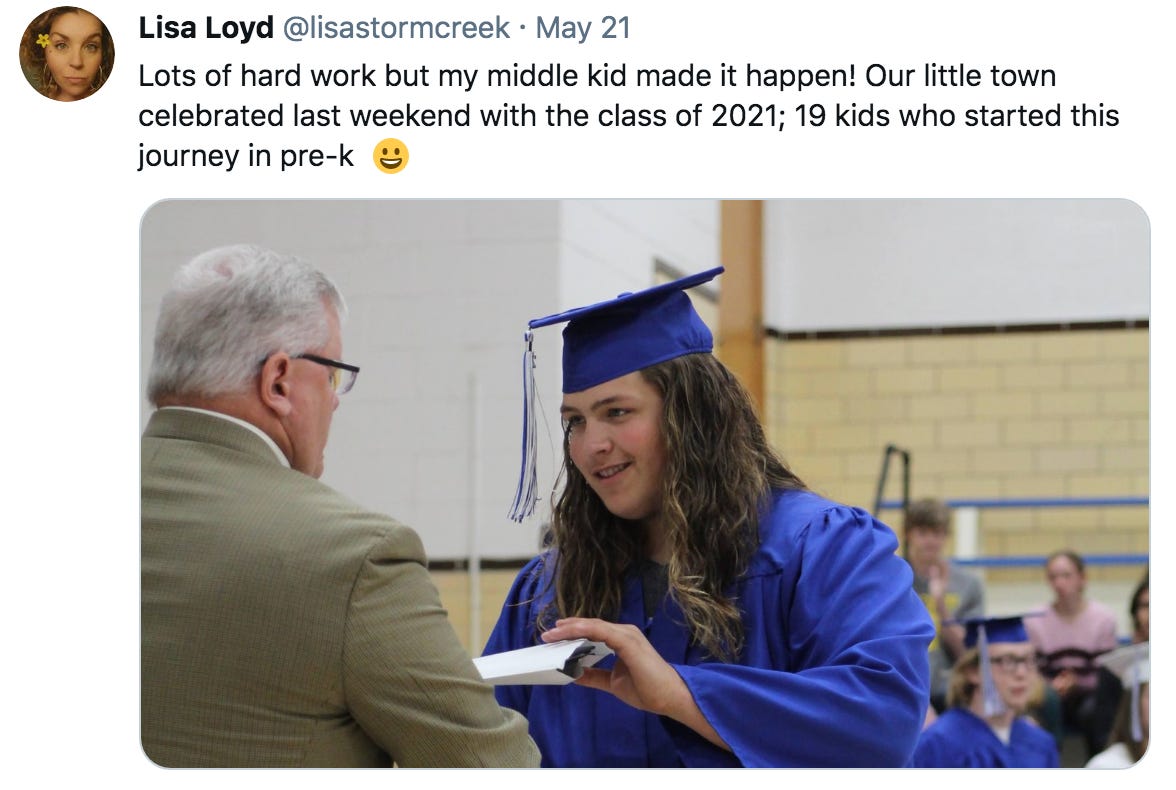
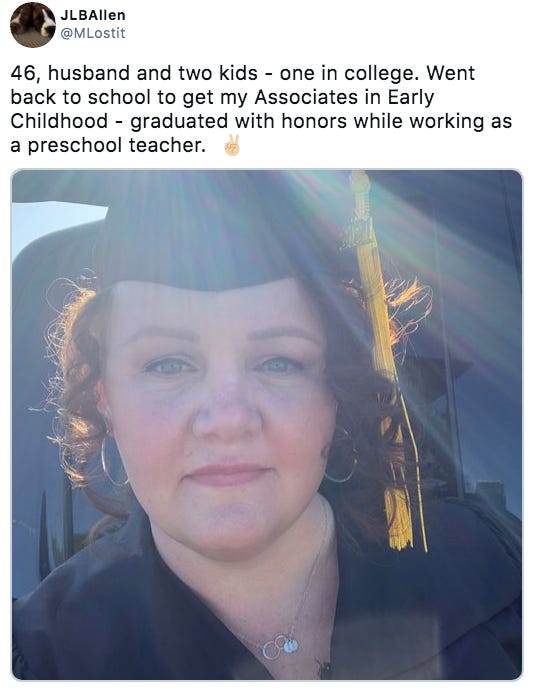
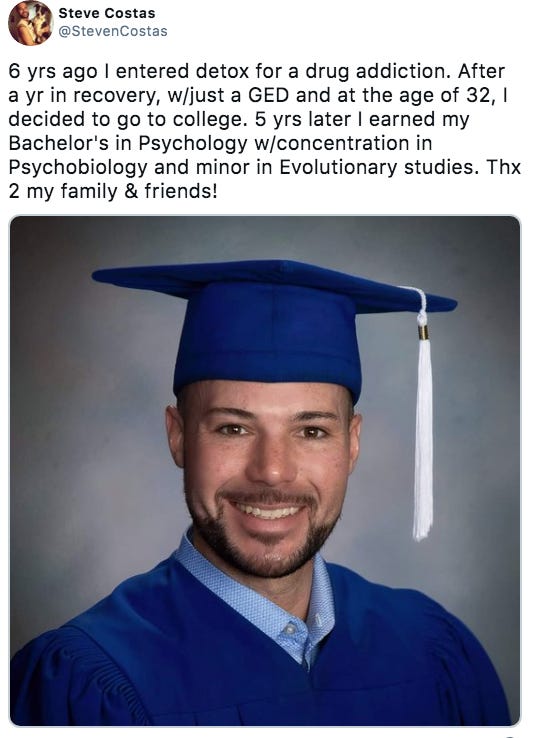
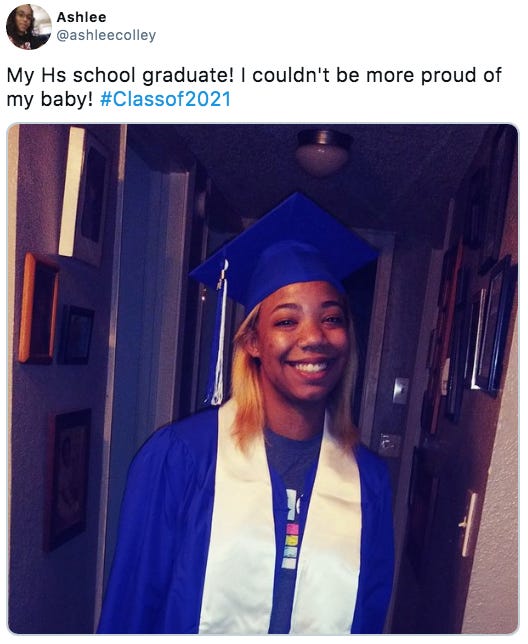
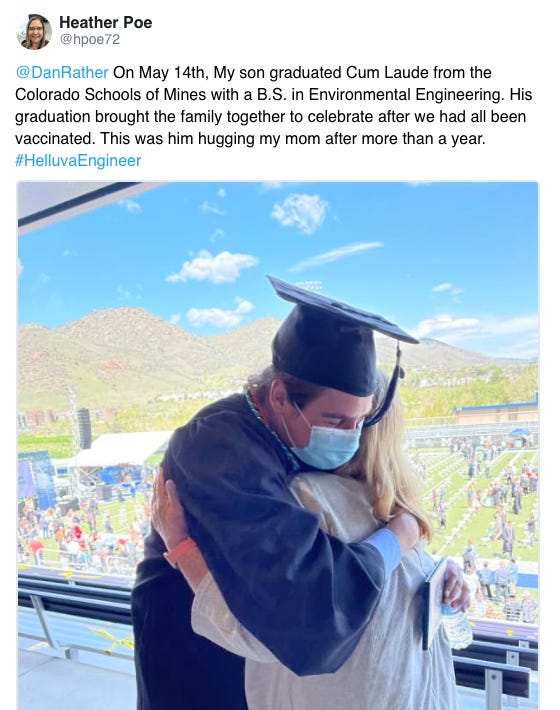
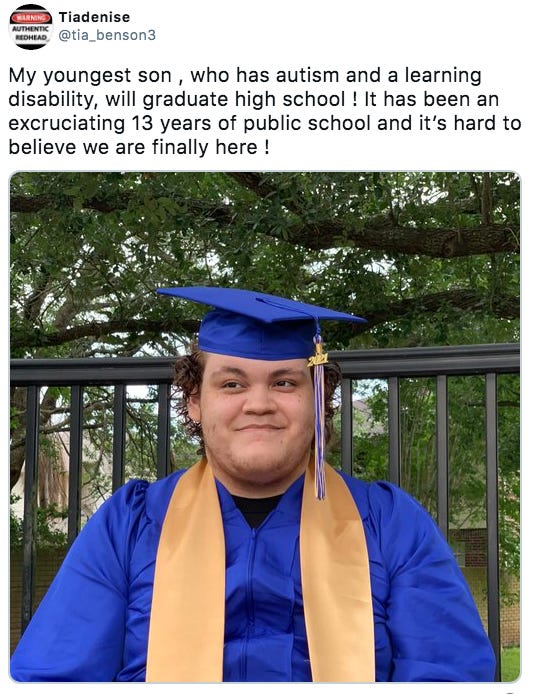
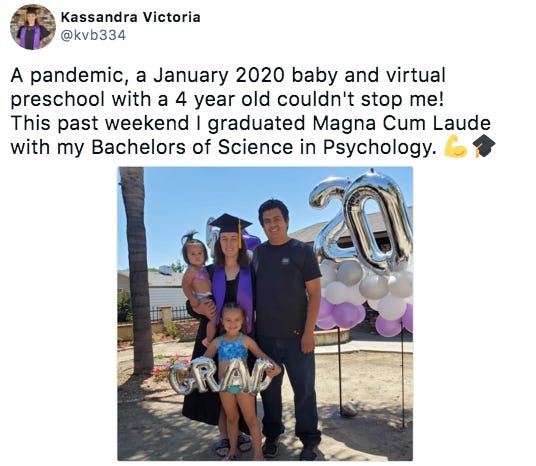
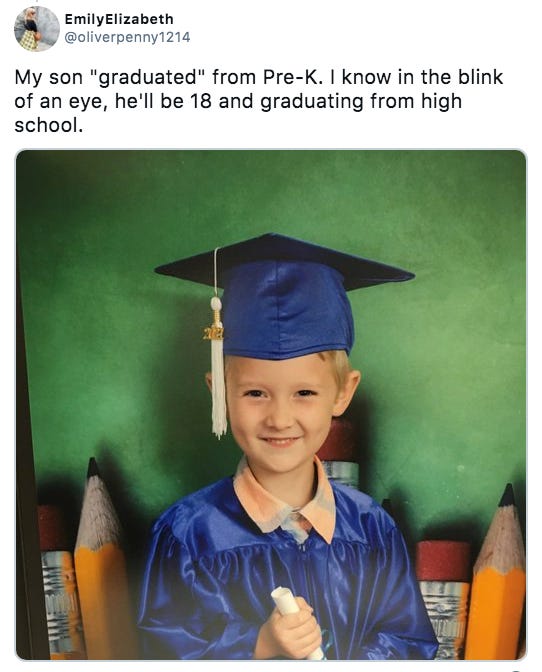
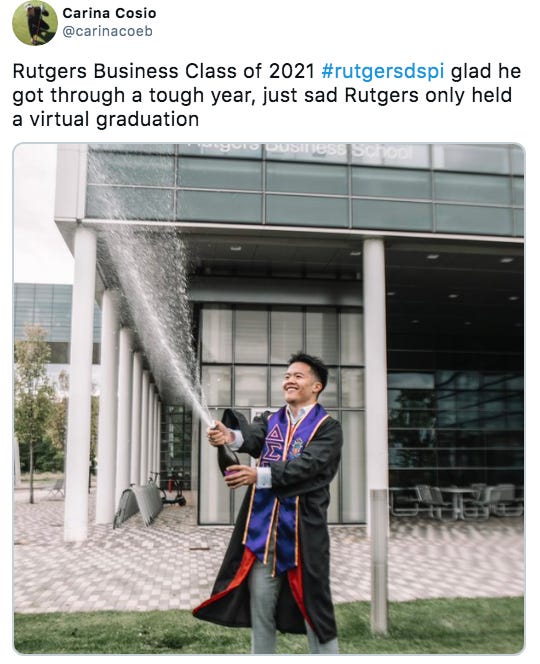
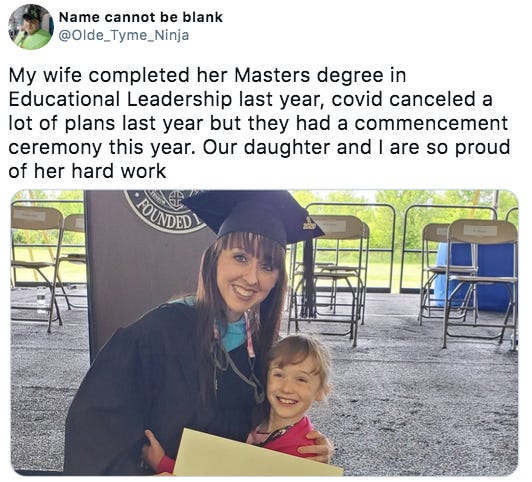
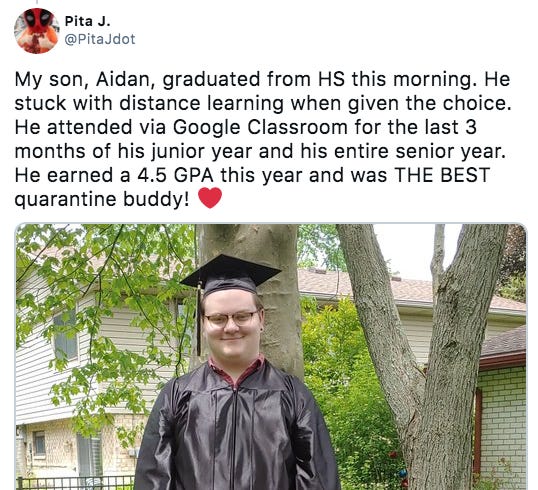
The pictures shared above give us all hope for the future. These people, and many more, persisted through many obstacles and have come out successfully. It’s important that each one of us knows that we can do it. No matter what we are facing, we can work through it. It may take more time than we imagined, but we can push through.
I always enjoy reading your comments. You bring brightness and hope to my day, and I’m sure too many others too. Thank you Dan, and keep the “steady” posts coming.